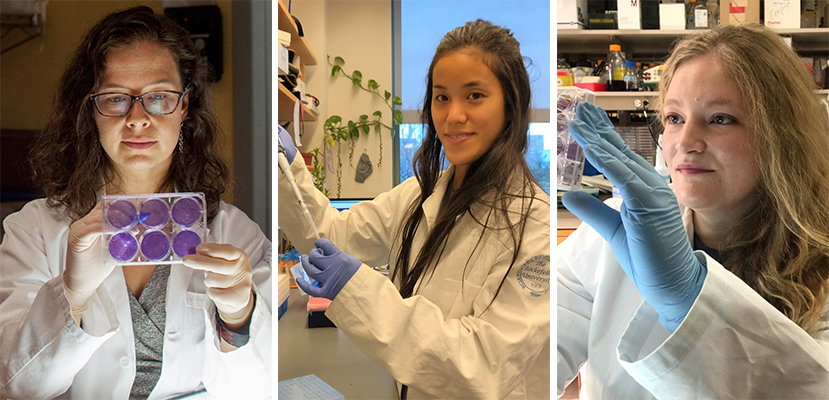Philanthropy News

BULGARI CORPORATION SUPPORTS ROCKEFELLER’S COVID-19 RESEARCH AND WOMEN SCIENTISTS
UPDATE May 2021—The first class of Bulgari Women & Science Fellows in COVID-19 Research were announced in December 2020.
Virologist Inna Ricardo-Lax works with Charles Rice, who shared the 2020 Nobel Prize in Physiology or Medicine for his contributions to the development of effective therapies for hepatitis C. When COVID-19 struck, Dr. Ricardo-Lax and the Rice lab shifted their focus to the SARS-CoV-2 virus. Their accomplishments include engineering harmless pieces of self-replicating coronavirus genetic material that can serve as a surrogate for the virus in lab research, allowing researchers to study the basic biology of the virus and screen for new antiviral drugs without the need for extraordinary biocontainment measures. Dr. Ricardo-Lax and her colleagues have also used CRISPR technology to identify human genes that play key roles in the virus’s ability to cause disease.
Sandra Nakandakari is a graduate fellow in the laboratory of immunologist Gabriel Victora. Her research focuses on the activity of B cells, the immune system cells responsible for making antibodies. Her aim is to understand the rules that determine the strength and duration of protection provided by antibodies produced in response to the SARS-CoV-2 virus and other infectious agents.
Frauke Muecksch joined Paul Bieniasz’ Laboratory of Retrovirology in 2019 with sterling credentials in HIV-1 research. In 2020, she turned her attention to COVID-19. Dr. Muecksch is a member of the team that developed rapid methods to evaluate antibodies generated by the immune system against SARS-CoV-2. This work led to the antibody therapy for COVID-19 treatment licensed by Bristol Myers Squibb in February 2021. Dr. Muecksch is now studying long-term immunological responses to SARS-CoV-2.
September 9, 2020—The Bulgari Corporation of America announced a major gift to create the Bulgari Women & Science Fund to Accelerate COVID-19 Research at The Rockefeller University. Over the next three years, the fund will augment the university’s wide-ranging research initiatives aimed at alleviating the COVID-19 pandemic and also support its women scientists in their training and careers.
Since the emergence of SARS-CoV-2, the coronavirus that causes COVID-19, at least 25 Rockefeller labs specializing in infectious disease, immunology, genomics, structural biology, and other areas have pivoted to studying the virus and how it causes disease. The effort currently involves more than 75 women scientists, and the Bulgari gift will support them as they work to develop novel preventions and treatments.
The studies underway are already yielding promising results. For example, newly developed drugs based on powerful neutralizing antibodies, present in the blood of some people who have recovered from SARS-CoV-2 infection, will soon be entering clinical trials. In other lines of investigation, Rockefeller scientists have discovered a potential way to block coronaviruses from entering human cells and identified human gene mutations that might explain why some infected individuals develop life-threatening pneumonia and other severe symptoms while others experience milder disease.
Part of Bulgari’s Virus Free Fund—created to support leading institutions pursuing innovative research into the cure and remission of different types of viruses—the new Bulgari Women & Science Fund to Accelerate COVID-19 Research at The Rockefeller University will establish nine Bulgari Women & Science Fellowships in COVID-19 for women graduate students and postdoctoral fellows working on the disease. It will also support the development and clinical testing of new coronavirus therapeutics, including drugs to help combat SARS-CoV-2 in the near term as well as treatments that hold promise as longer-term strategies both to alleviate the present coronavirus pandemic and prevent future ones.
In a webinar announcement of the gift, Rockefeller University President Richard P. Lifton commended Bulgari for its dedication to corporate social responsibility.
“Bulgari’s visionary generosity is not only helping Rockefeller address the global health crisis we are now facing, but it is also providing the foundation for future discoveries by generations of world-class women scientists,” Lifton says, adding that the two organizations share a commitment to supporting women in their professional careers.
For the past 21 years, Rockefeller’s Women & Science program has been instrumental in recruiting women faculty to the university and has funded more than 240 fellowships for women. The program has served as a blueprint for similar efforts at many other scientific institutions.